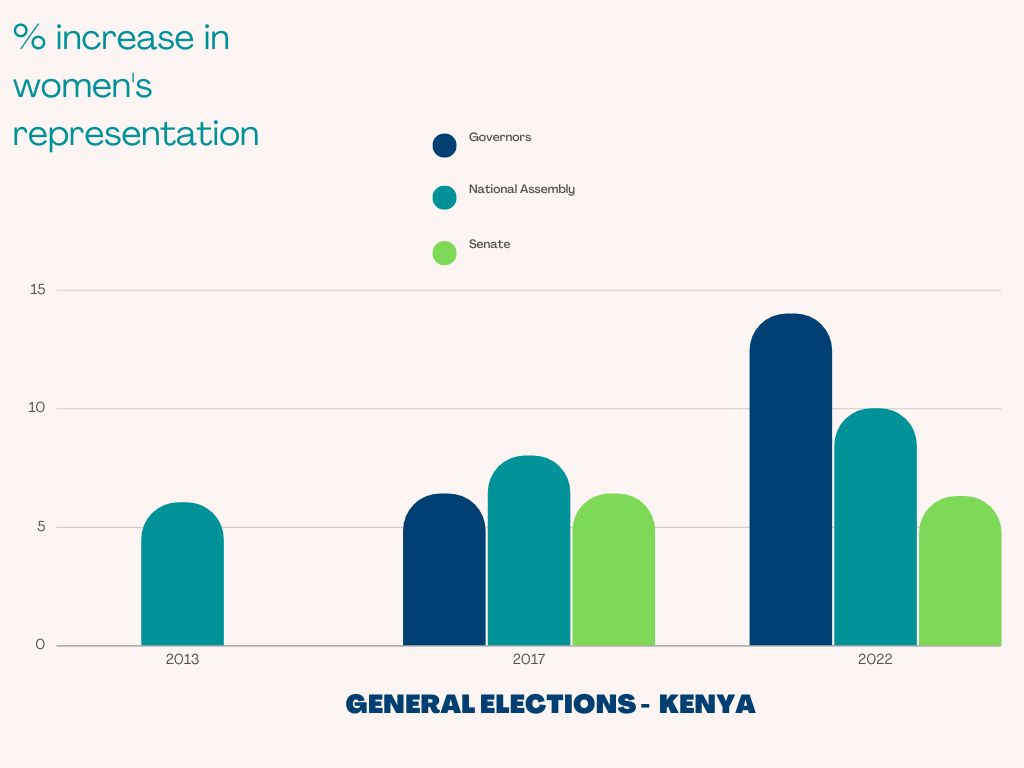Celebrate the steps women are gaining in elective positions.

We congratulate the newly elected leaders for breaking barriers by getting elected into office to serve the people of Kenya. There is an indication that Kenyans are shifting from underpinnings that for a long time undermined prospects of more women holding leadership positions in social, economic and political spaces.
Barriers that once blocked women’s eligibility for leadership roles are now being questioned and put to rest. Indeed the wind of change is blowing, sails adjusting accordingly.
Background of the problem
It is no surprise the two-thirds gender rule has been ongoing for a while now. There is no definite end in sight.
We ask ourselves, is the just concluded 2022 general election a step in the desired direction? Is it a sign that our nation is progressing, becoming more inclusive and breaking barriers for women in politics?
It is encouraging to witness a steady increase of women getting elected into positions as governors, senators and members of the national assembly. Statistically, there has been a 29% increase from the 2017 election.” Previously in 2017, Women held 172 of the 1,883 elected seats in Kenya, up from 145 after the 2013 elections.
The two-thirds rule is a significant article of the constitution, which expressly seeks to provide a framework for addressing gender inequalities. Despite its requirement that a single gender cannot make up more than two-thirds of parliament, still, the gender gap exists.

Gender analysis
A Gender Analysis of the 2017 Kenya General Election delves into past elections and describes the cultural, economic, and political factors barring women from actively seeking elective positions. These factors include inadequate support from political parties, especially during party primaries, limited financial resources, gender stereotyping and the level of patriarchy in the society.
Since the 2010 Constitution established a gender quota, the legislature has had unsuccessful attempts to pass the required legislation. The legislative blockage reflects the slow progress women face when it comes to politics. Women have found that “gatekeepers” are often reluctant to support female candidates. Unimplemented legislation has left women to fight it out at the ballot since the nominated positions are not enough to bridge the gap.
Change is coming
The just concluded 2022 General Election yielded seven governors, three senators and 26 women members of the national assembly, a welcome achievement for women and the country. A continuation of what began with Grace Onyango, the first woman to hold a political position as councillor and Kisumu Mayor in 1960. It is heartwarming that more women are gaining a seat at the table. Notably, at twenty-four years, Hon. Linet Toto swept away the immense competition to become the Bomet County Woman Representative. Gladys Wanga is now the first woman governor of Homa Bay County. Hon. Anne Waiguru re-elected for a second term as governor of Kirinyaga County. The rest of the newly elected women governors: Hon. Fatuma achani (Kwale), Hon. Cecily Mbarire (Embu), Hon. Kawira Mwangaza(Meru) and Hon. Wavinya Ndeti (Machakos).
Nakuru County put the icing on the cake as eight women successfully manoeuvred the gender bias and got elected into office in various capacities. Four of the eleven elective National Assembly positions are held by women, while Hon. Susan Kihika and Hon. Tabitha Karanja will serve as governor and senator, respectively.”
Conclusion
NALSA(K) members play a supportive role to our spouses in the National Assembly. One of our objectives as an association is empowering girls and women, so seeing the strides women are making in politics is a cause of celebration for us.
The increased presence of women leadership at all levels of decision-making is critical in advancing justice and equality: increased presence has led to further economic, social and political progress for all humanity. Having women in leadership ensures that law and policy are more inclusive, representative of the population demographics and consider diverse views.
Generally, work still needs to be done to lower gender inequalities. Whether in politics, the workplace or at home, at the moment, there is progress which is reason enough to celebrate.
Post by Brian Anyanzwa
